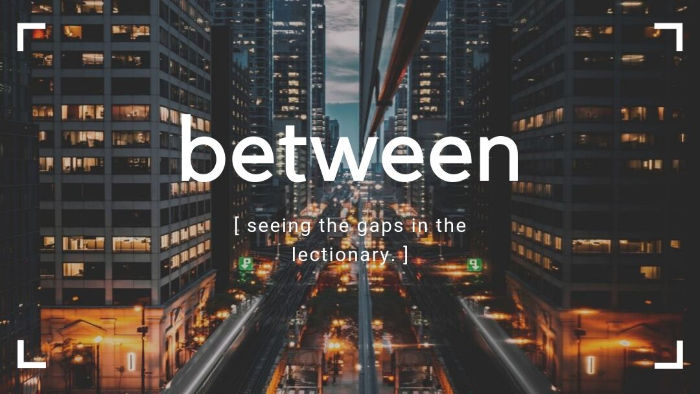
A look at the gaps in the lectionary.
This week: the gap between Proper 19A and 20A
The text: Matthew 19:1-30
Jesus takes a fascinating stand on marriage, children, and wealth. A stand through which we wrongly bind him up with the 1980s vision of “family values”. What Jesus does offer is a reminder of our weakness and how God’s dream for humanity is actually arranged.
Jesus on divorce
A lot has been made out of the slim things Jesus said about marriage, divorce, and sexuality. Much tradition and theology is dependent, not on the words of Jesus, but on the assumed natural order of the world.
So when we get to something Jesus actually does say about it all, our blinders can make it difficult to actually deal with it.
Jesus doesn’t endorse marriage. Or celibacy. Or divorce. In fact, there is no endorsement of anything here.
What there is, however, is a harsh critique of human nature and our willingness to think rules don’t really apply to us. There is also a harsh critique of the man-made rules which imprison women in unjust marital relationships.
In short: Jesus doesn’t say anything supportive about marriage or divorce, but that we pretty well suck at marriage and therefore have divorce to protect us from our own terribleness.
At the same time, he also levels a critique of the system which empowers men and gives them opportunity to exploit the lives of women without giving women such power.
Celibacy
Whereas the writing of Paul encourages celibacy, Jesus in Matthew doesn’t. He makes it a matter of calling and circumstance, rather than something we ought to consider.
His disciples seem to make the assumption, based on the disfavor of the motivations of men in marriage, that celibacy would be preferred. And Jesus knocks that theory down. It is a calling, not a thing that is “better” for anyone.
This is notable, given our penchant for naming things as better or preferred, rather than focus on orientation or design. Because we want to follow a rule, not only as a rule, but because it is better than not. And we are obsessed with making ourselves better than we are.
Jesus says no to this. Don’t think celibacy is better. It is what some are called to. Full stop.
Kids are first
Then people start bringing children to Jesus and the disciples treat them like they are in the way, what with all of their noisiness and playing. They can’t hear the preacher, for God’s sake!
Jesus has to remind the disciples of what he just said to them. Children are first in the kin-dom. Being a stumbling block to their grace is an automatic death sentence.
Jesus refrains from throwing out “Get behind me, Satan!” again. But it would be apt here.
The Rich Young Man
Now the familiar story/parable of the pious man who wants certainty in the afterlife.
Jesus asks the young man if he has followed God’s commands and the guy says he has. Then he tells him that if he wants to be perfect he should sell his stuff, give the money to the poor, and follow Jesus.
Cue the tears.
The solid move in this moment, of course, is when Jesus names six out of the ten commandments, rewording one of them to speak directly to exploitation. After all, wealth in the ancient world was synonymous with exploitation. And this man was wealthy.
Getting rid of that wealth amounts to restitution.
While the same thing could be said for modern capitalism, we hide the exploitation by disembodying the relationship between exploiter and exploited so we can sleep at night.
This makes the arrangement a bit more fraught than we like to think. Jesus is calling the man’s bluff and the man doesn’t catch it. He thinks his piety will save him when Jesus knows that he can’t see the problem.
The problem of wealth
Perhaps this is why the teaching about the camel getting through the eye of the needle is so potent.
A cartoon I came across recently depicted a man riding a camel through a giant hoop. The words at the bottom declared “How big the rich think a needle’s eye is.”
We rightly understand that people in general don’t think they have any problems. But this isn’t a general situation, but the particular blindness offered to us by wealth. That we don’t see how damaging our wealth is to other people. We want it to be about us when Jesus keeps saying it’s about all of us.
The personhood of the rich person isn’t the problem. It really is the wealth—and what it does to our perceptions.
Peter and possessions
Then the everyman speaks for us again. He hears this teaching on wealth and is like, Well, if we follow this logic, we’ll be left with nothing! This is a natural response. It’s where most of us go.
Except that it shows how Peter has devalued what he has.
He and the other disciples gave up everything long ago. And now they have the world. They are the embodiment of Jesus’s teachings—and yet they hear those teachings and are like This sounds hard!
Peter is trying to work through this as an abstract principal from the side of the Kingdoms of Earth when he has been living in the Kin-dom of Heaven. Accountants measure completely different wealth there.
Looking forward
Chapter 20 begins with another parable. This one about labor and wealth. We’re arriving at a teaching many will struggle to fully understand without the above teachings about rules, wealth, and what holds real value. So let’s remember what would be fresh on the disciples minds when they hear this parable about true fairness.
